Yongxiang Tang
VQL: An End-to-End Context-Aware Vector Quantization Attention for Ultra-Long User Behavior Modeling
Aug 23, 2025Abstract:In large-scale recommender systems, ultra-long user behavior sequences encode rich signals of evolving interests. Extending sequence length generally improves accuracy, but directly modeling such sequences in production is infeasible due to latency and memory constraints. Existing solutions fall into two categories: (1) top-k retrieval, which truncates the sequence and may discard most attention mass when L >> k; and (2) encoder-based compression, which preserves coverage but often over-compresses and fails to incorporate key context such as temporal gaps or target-aware signals. Neither class achieves a good balance of low-loss compression, context awareness, and efficiency. We propose VQL, a context-aware Vector Quantization Attention framework for ultra-long behavior modeling, with three innovations. (1) Key-only quantization: only attention keys are quantized, while values remain intact; we prove that softmax normalization yields an error bound independent of sequence length, and a codebook loss directly supervises quantization quality. This also enables L-free inference via offline caches. (2) Multi-scale quantization: attention heads are partitioned into groups, each with its own small codebook, which reduces quantization error while keeping cache size fixed. (3) Efficient context injection: static features (e.g., item category, modality) are directly integrated, and relative position is modeled via a separable temporal kernel. All context is injected without enlarging the codebook, so cached representations remain query-independent. Experiments on three large-scale datasets (KuaiRand-1K, KuaiRec, TMALL) show that VQL consistently outperforms strong baselines, achieving higher accuracy while reducing inference latency, establishing a new state of the art in balancing accuracy and efficiency for ultra-long sequence recommendation.
Distribution-Guided Auto-Encoder for User Multimodal Interest Cross Fusion
Aug 20, 2025Abstract:Traditional recommendation methods rely on correlating the embedding vectors of item IDs to capture implicit collaborative filtering signals to model the user's interest in the target item. Consequently, traditional ID-based methods often encounter data sparsity problems stemming from the sparse nature of ID features. To alleviate the problem of item ID sparsity, recommendation models incorporate multimodal item information to enhance recommendation accuracy. However, existing multimodal recommendation methods typically employ early fusion approaches, which focus primarily on combining text and image features, while neglecting the contextual influence of user behavior sequences. This oversight prevents dynamic adaptation of multimodal interest representations based on behavioral patterns, consequently restricting the model's capacity to effectively capture user multimodal interests. Therefore, this paper proposes the Distribution-Guided Multimodal-Interest Auto-Encoder (DMAE), which achieves the cross fusion of user multimodal interest at the behavioral level.Ultimately, extensive experiments demonstrate the superiority of DMAE.
BBQRec: Behavior-Bind Quantization for Multi-Modal Sequential Recommendation
Apr 09, 2025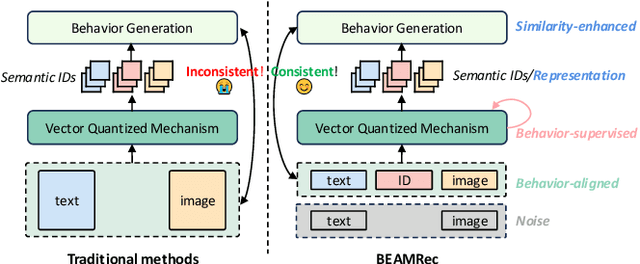
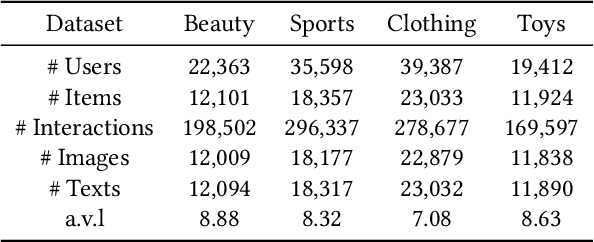
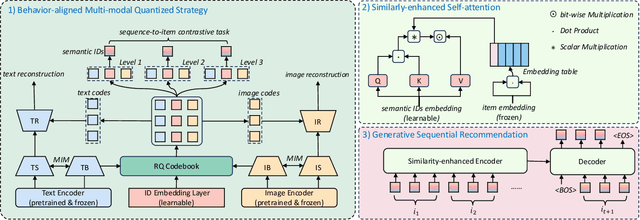
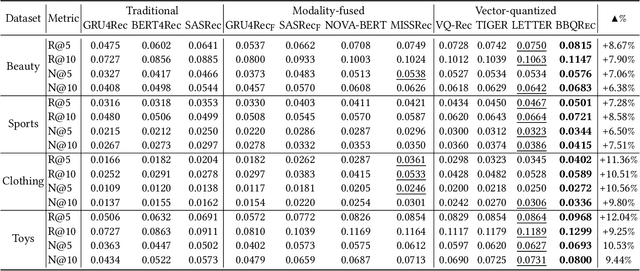
Abstract:Multi-modal sequential recommendation systems leverage auxiliary signals (e.g., text, images) to alleviate data sparsity in user-item interactions. While recent methods exploit large language models to encode modalities into discrete semantic IDs for autoregressive prediction, we identify two critical limitations: (1) Existing approaches adopt fragmented quantization, where modalities are independently mapped to semantic spaces misaligned with behavioral objectives, and (2) Over-reliance on semantic IDs disrupts inter-modal semantic coherence, thereby weakening the expressive power of multi-modal representations for modeling diverse user preferences. To address these challenges, we propose a Behavior-Bind multi-modal Quantization for Sequential Recommendation (BBQRec for short) featuring dual-aligned quantization and semantics-aware sequence modeling. First, our behavior-semantic alignment module disentangles modality-agnostic behavioral patterns from noisy modality-specific features through contrastive codebook learning, ensuring semantic IDs are inherently tied to recommendation tasks. Second, we design a discretized similarity reweighting mechanism that dynamically adjusts self-attention scores using quantized semantic relationships, preserving multi-modal synergies while avoiding invasive modifications to the sequence modeling architecture. Extensive evaluations across four real-world benchmarks demonstrate BBQRec's superiority over the state-of-the-art baselines.
CHIME: A Compressive Framework for Holistic Interest Modeling
Apr 09, 2025Abstract:Modeling holistic user interests is important for improving recommendation systems but is challenged by high computational cost and difficulty in handling diverse information with full behavior context. Existing search-based methods might lose critical signals during behavior selection. To overcome these limitations, we propose CHIME: A Compressive Framework for Holistic Interest Modeling. It uses adapted large language models to encode complete user behaviors with heterogeneous inputs. We introduce multi-granular contrastive learning objectives to capture both persistent and transient interest patterns and apply residual vector quantization to generate compact embeddings. CHIME demonstrates superior ranking performance across diverse datasets, establishing a robust solution for scalable holistic interest modeling in recommendation systems.
S-Diff: An Anisotropic Diffusion Model for Collaborative Filtering in Spectral Domain
Dec 31, 2024



Abstract:Recovering user preferences from user-item interaction matrices is a key challenge in recommender systems. While diffusion models can sample and reconstruct preferences from latent distributions, they often fail to capture similar users' collective preferences effectively. Additionally, latent variables degrade into pure Gaussian noise during the forward process, lowering the signal-to-noise ratio, which in turn degrades performance. To address this, we propose S-Diff, inspired by graph-based collaborative filtering, better to utilize low-frequency components in the graph spectral domain. S-Diff maps user interaction vectors into the spectral domain and parameterizes diffusion noise to align with graph frequency. This anisotropic diffusion retains significant low-frequency components, preserving a high signal-to-noise ratio. S-Diff further employs a conditional denoising network to encode user interactions, recovering true preferences from noisy data. This method achieves strong results across multiple datasets.
Scenario-Adaptive Fine-Grained Personalization Network: Tailoring User Behavior Representation to the Scenario Context
Apr 15, 2024Abstract:Existing methods often adjust representations adaptively only after aggregating user behavior sequences. This coarse-grained approach to re-weighting the entire user sequence hampers the model's ability to accurately model the user interest migration across different scenarios. To enhance the model's capacity to capture user interests from historical behavior sequences in each scenario, we develop a ranking framework named the Scenario-Adaptive Fine-Grained Personalization Network (SFPNet), which designs a kind of fine-grained method for multi-scenario personalized recommendations. Specifically, SFPNet comprises a series of blocks named as Scenario-Tailoring Block, stacked sequentially. Each block initially deploys a parameter personalization unit to integrate scenario information at a coarse-grained level by redefining fundamental features. Subsequently, we consolidate scenario-adaptively adjusted feature representations to serve as context information. By employing residual connection, we incorporate this context into the representation of each historical behavior, allowing for context-aware fine-grained customization of the behavior representations at the scenario-level, which in turn supports scenario-aware user interest modeling.
* Accepted by SIGIR 2024, 10 pages, 5 figures, 5 tables
CROLoss: Towards a Customizable Loss for Retrieval Models in Recommender Systems
Aug 05, 2022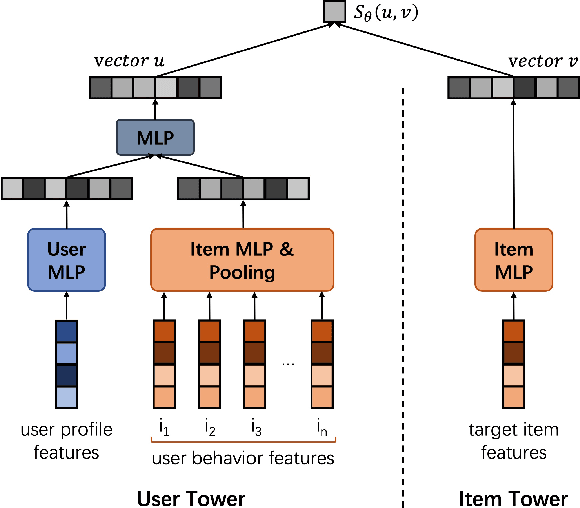

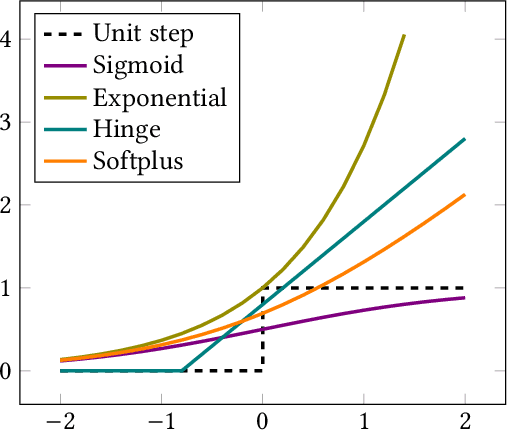
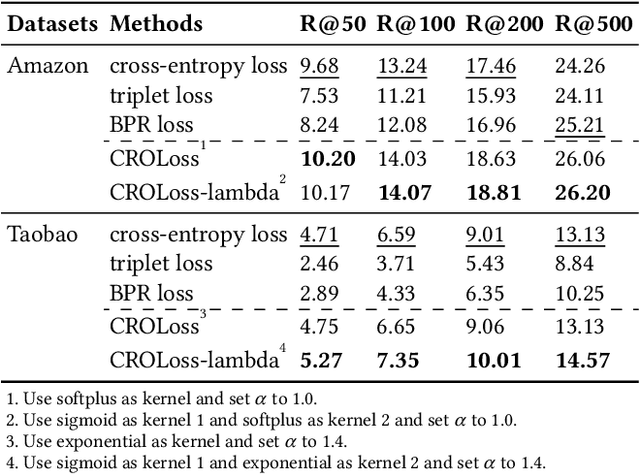
Abstract:In large-scale recommender systems, retrieving top N relevant candidates accurately with resource constrain is crucial. To evaluate the performance of such retrieval models, Recall@N, the frequency of positive samples being retrieved in the top N ranking, is widely used. However, most of the conventional loss functions for retrieval models such as softmax cross-entropy and pairwise comparison methods do not directly optimize Recall@N. Moreover, those conventional loss functions cannot be customized for the specific retrieval size N required by each application and thus may lead to sub-optimal performance. In this paper, we proposed the Customizable Recall@N Optimization Loss (CROLoss), a loss function that can directly optimize the Recall@N metrics and is customizable for different choices of N. This proposed CROLoss formulation defines a more generalized loss function space, covering most of the conventional loss functions as special cases. Furthermore, we develop the Lambda method, a gradient-based method that invites more flexibility and can further boost the system performance. We evaluate the proposed CROLoss on two public benchmark datasets. The results show that CROLoss achieves SOTA results over conventional loss functions for both datasets with various choices of retrieval size N. CROLoss has been deployed onto our online E-commerce advertising platform, where a fourteen-day online A/B test demonstrated that CROLoss contributes to a significant business revenue growth of 4.75%.
 Add to Chrome
Add to Chrome Add to Firefox
Add to Firefox Add to Edge
Add to Edge